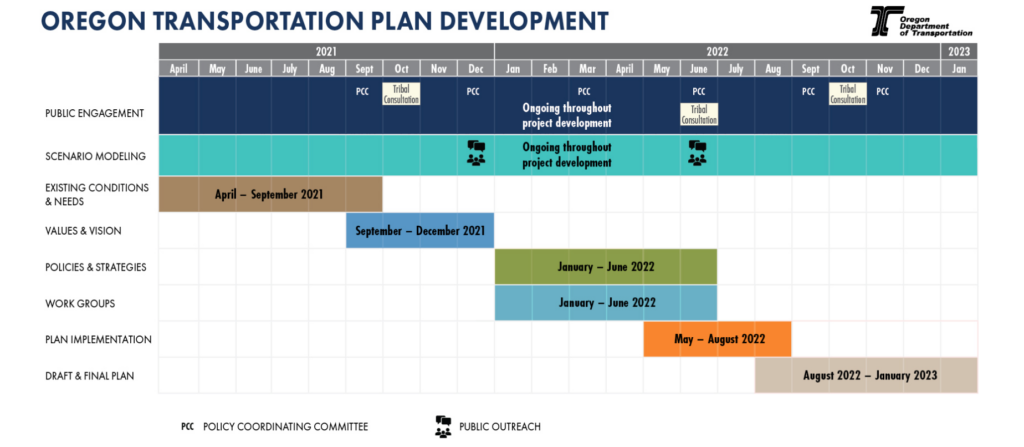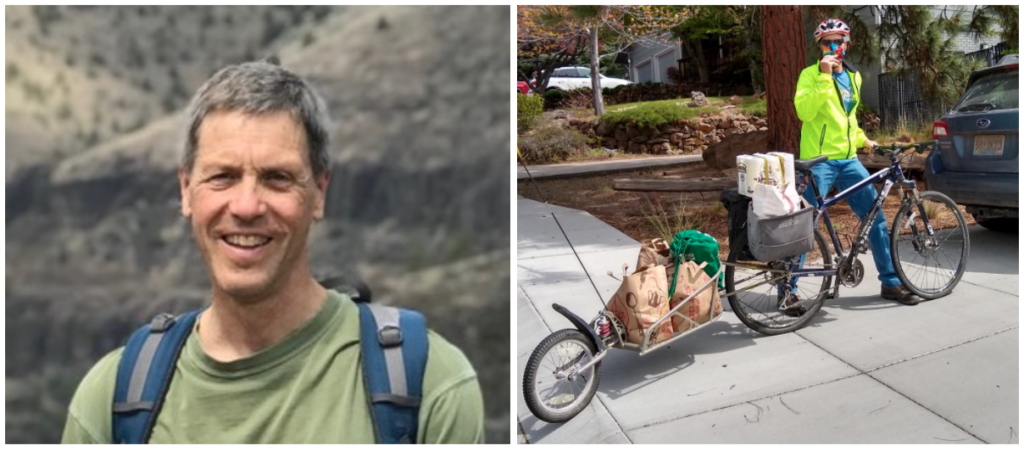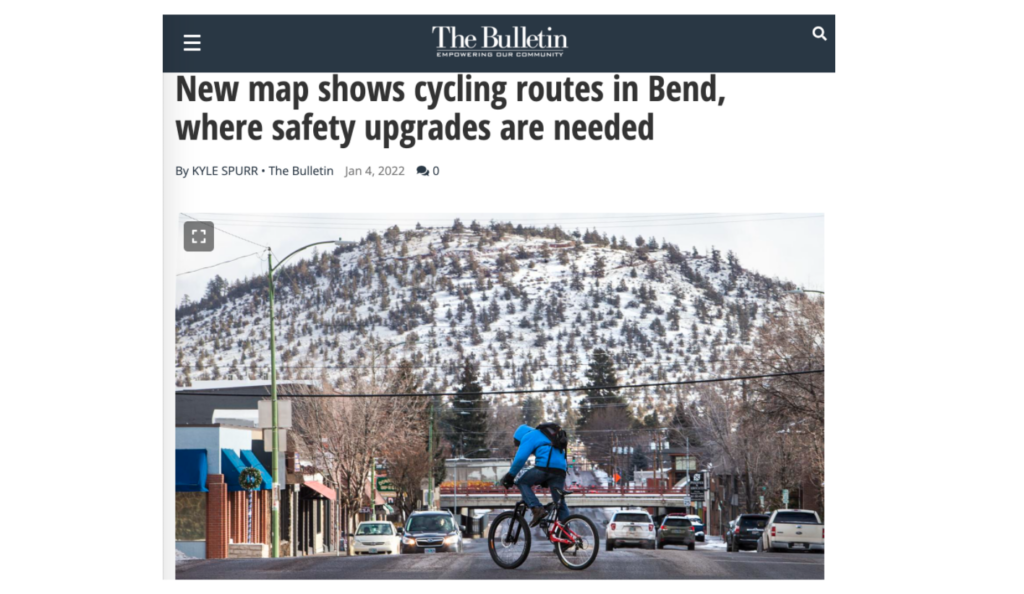With warm June-uary days, it has been a joy to get back out on our bikes! Beware the gravel, grit, and cinder that is typical this time of year. While the City has a fairly set schedule of street sweeping to prioritize the areas that drain to the Deschutes River after a big weather event, let the City of Bend maintenance folks know if there is a spot that is particularly terrible.
Call to Action: If Bend Bikes Had a Billion Transportation Dollars…
The federal Infrastructure Investment and Jobs Act (IIJA) was signed into law on November 15, 2021 and will bring a multi-billion dollar, once-in-a-generation investment of funds to Oregon to address transportation infrastructure needs. Oregon’s transportation decision-makers need to hear that climate and equity should be at the forefront of investing these funds.
The Clean and Just Transportation Network (CJTN) brings together more than 35 statewide transportation experts, environmental justice and community based organizations, climate groups, and allies in the labor movement. Bend Bikes board president LeeAnn O’Neill was honored to be a panelist for a recent CJTN webinar on transforming Oregon’s transportation future as a part of a statewide advocacy effort around the IIJA dollars that Oregon (including Bend) will receive. Funding is one of the biggest barriers we face in Bend for better infrastructure for people who walk, bike, roll, and take transit.
The Oregon Transportation Commission (which is basically the boss of ODOT) will decide on a spending “scenario” in March for the IIJA dollars. Scenario 2 purports to be the “Public and Active Transportation” package, yet it still allocates $148 million to fixing, maintaining, and enhancing highways.

The OTC’s proposed spending scenarios are business as usual and reflect past patterns of transportation investment instead of the visionary thinking we need for a sustainable future. We are asking folks to submit written comments and/or sign up to provide verbal comments at the next meeting to tell the OTC:
- The Bend community would like to see a more progressive spending scenario that more explicitly prioritizes people who walk, bike, roll, and take transit as well as climate and equity considerations.
- We want the OTC to think outside the box and vision a spending scenario that allocates funds to active transportation in addition to – and separate from – the Safe Routes to School funding, Great Streets (aka “orphan highways”), inter-city transit, and intra-city transit (as well as the funding buckets already identified for local climate planning, overdue ADA required improvements, federal ODOT grant matching, and business and development).
If you want more ideas on what to ask for, check out the panel recording or reach out to us at [email protected]!
How to provide testimony at OTC meetings: You can submit written testimony online or to [email protected]. To testify orally at the meeting, you must sign up in advance (typically the window to sign up is from the Friday before the meeting until 4pm on the day before the meeting). The key OTC meetings are February 17th from 12:30 – 2:30 pm and March 30th from 12 – 2 pm and information on how to sign up to testify and attend the meeting is at https://www.oregon.gov/odot/get-involved/pages/otc_main.aspx.
Board Secretary Elisa Cheng Appointed to the Mobility and Accessibility Workgroup to Update the Oregon Transportation Plan
The Oregon Department of Transportation (ODOT) is developing a new Oregon Transportation Plan (OTP) to update the state’s transportation policy framework. The OTP sets the long-term transportation policy for the whole state. This update will inform and guide transportation investment decisions by ODOT and regional and local governments for the next 20 to 25 years. The OTP sets the vision for all modes of transportation in Oregon, including walking, biking, rolling, and public transit.
Board secretary Elisa Cheng was singled out and invited as a subject matter expert in active transportation to the mobility and accessibility work group, which is advisory to the Policy Coordinating Committee and ultimately, the Oregon Transportation Commission.

One of the biggest lessons learned from this past year was the importance of sitting on advisory committees and coalition building with like-minded organizations in being considered a relevant and influential voice with policymakers as well as city and state staff. Bend Bikes members are becoming the “go to” for regional transportation expertise and subject matter expertise!
Welcome David Green to the Bend Bikes Board!

David Green moved to Bend in 2015 to take advantage of the amenities of what seemed a big city with easy access to natural areas. He enjoys bike packing, road riding, and doing errands on his bike. A longtime supporter and volunteer with Bend Bikes and current member of the Deschutes County Bicycle and Pedestrian Advisory Committee, he came to cycling advocacy after meeting far too many people who enjoy biking but avoid riding on the streets of Bend. He wants to see a walkable, cyclable Bend where kids, seniors, and everyone in between can comfortably get around on foot and by bike.
Bike Map Release and Thank You for Your Support!
Thank you to everyone who took the time to check out our new bike map! We were excited to see it highlighted by a number of local news sources, including a cover story in the Bend Bulletin (a first for Bend Bikes) and an interview segment on KTVZ. Community partners Pine Mountain Sports, Commute Options, and Bend Electric Bikes also featured the bike map in their newsletters.

It is community support like this that drives our efforts. We are taking a little time to recover from the work it took to get the map launched and give time for folks to give us feedback. We will start sifting through all the feedback in the coming months, so stay tuned for more updates!
Bend Bikes Vision: All the Reasons People Bike are Important
Oftentimes in conversation we have observed the rhetoric “that people who bike need to share the road because they are just out for a recreational ride.” This language indicates that if you see a person riding a road bike, that person is “just recreating,” and that somehow, is a less legitimate reason to use our road space than other types of vehicular transportation. The reality is that only 15% of car trips are taken to commute to work. In our community, people use cars to get to the trailhead to hike or mountain bike, go to Mt. Bachelor to ski, or just go to a food truck lot with friends – and yet all car trips are viewed as a “legitimate” use of the road. Why does a person “recreating” in their car have more reason to be on the road than someone “recreating” on their bike?

We need to embrace that any reason we need to go from Point A to Point B by bicycle is legitimate. A trip to drop off children at school, pick up groceries, go shopping, go to the trailhead, go to work, get exercise, and really, go anywhere we need to go are all equally important. We don’t judge people in cars as to why they are in their cars, so why should we judge people who bike as to why they are biking?
